Made in McHenry: How Bobby Miller's hometown stoked his fiery 'competitive mindset'
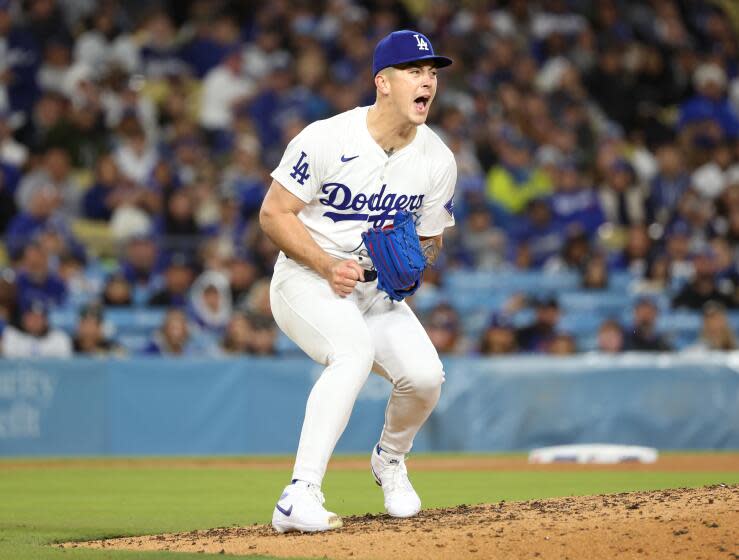
In some ways, Bobby Miller feels like a freshman all over again.
He’s the youngest member of his team’s starting rotation, and also among the most important. He’s trying to aid a championship pursuit, while also refining his ever-evolving game on the fly.
It’s the same way Miller felt 10 years ago as a teenage prospect on his hometown high school team in McHenry, Ill., attempting to catapult his big-league dreams and establish himself as a future star in the making.
This year, the stage is different, but the circumstances are similar.
After flashing tantalizing stuff and consistent production in his rookie campaign with the Dodgers last year, Miller’s sophomore MLB season has been derailed by a couple of poor starts and, more frustrating, a two-month-long shoulder injury.
Read more: Despite circumstances, Dodgers believe 'this is the right time' for Bobby Miller's debut
Despite going 11-4 in 2023 with a 3.76 ERA, he is having to prove himself all over again this year, trying to turn promising physical talent back into repeatable big-league dominance for a Dodgers team with World Series aspirations.
"He's a big piece to the puzzle,” manager Dave Roberts said at the start of the season. “He's a top-end guy.”
Or, at least, he has the potential to be — with a 100-mph fastball, an array of deceptive breaking pitches, and a highly regarded work ethic that dates to his high school days.
Like last year — and an unlikely path to the big leagues that started in McHenry long before that — the X-factor to Miller’s success is his emotional control and competitive composure; making sure the fire that fuels his talent is always being stoked in the right direction.
At his best, Miller can produce the kind of magic he did in his season debut on March 29, when his scoreless six-inning, 11-strikeout, career-best start against the St. Louis Cardinals was punctuated with ferocious flexes, primal screams and animated reactions as he came off the mound.
“That’s the best I’ve seen Bobby look,” future Hall of Fame teammate Clayton Kershaw said then. “From the first pitch, it was domination. That was really fun to watch.”
Since that night, however, Miller’s season has been sidetracked. First, by a five-run clunker in a homecoming game against the Chicago Cubs, when dozens of his friends and family from nearby McHenry packed the stands. Then, by the shoulder injury he suffered after a four-inning, two-run outing in Minnesota the following week, one that left him sidelined until the Dodgers’ trip to Colorado last Wednesday.
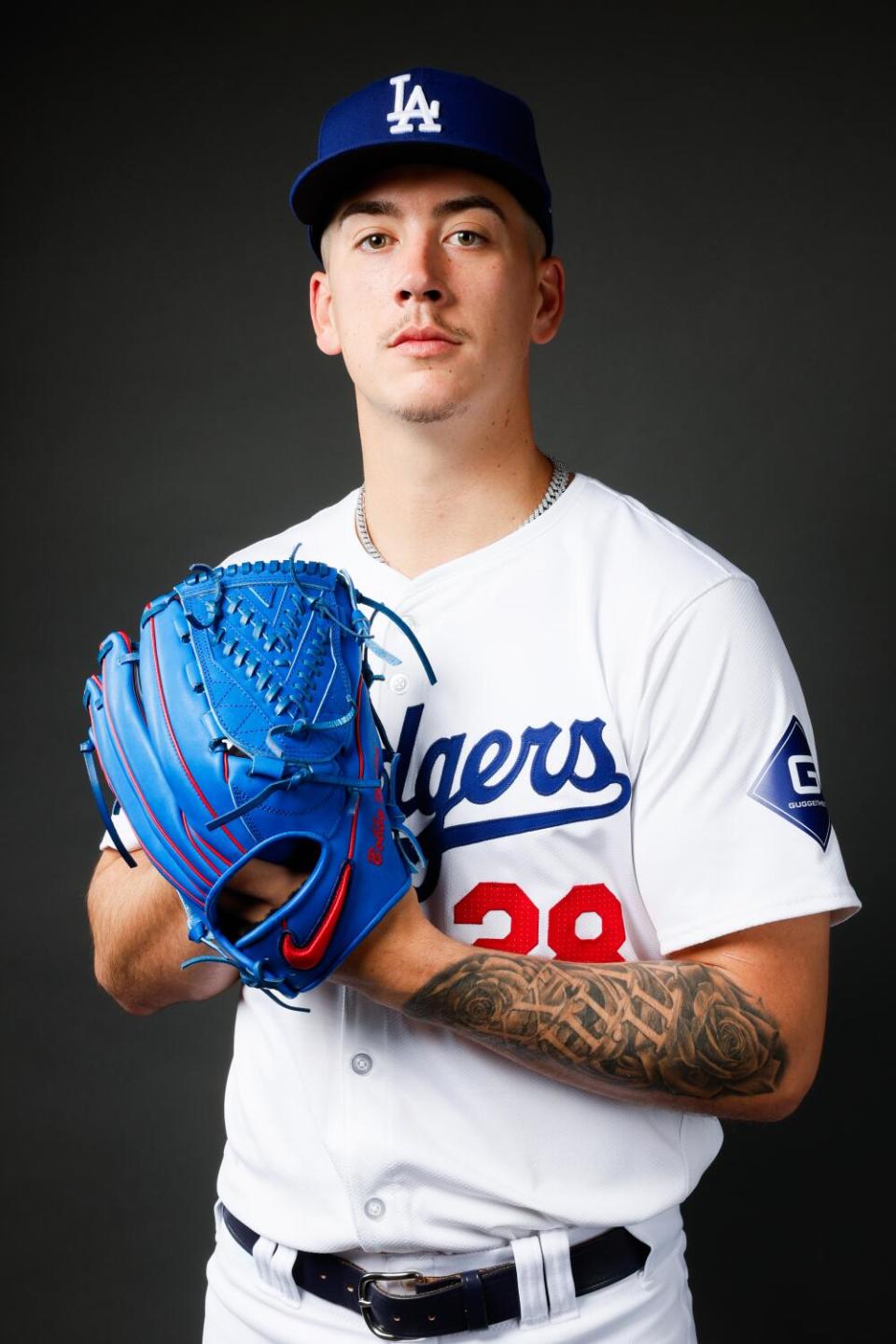
Now that he's healthy again, however, Miller’s importance to the team has only been amplified.
For a pitching staff that’s without Yoshinobu Yamamoto because of a shoulder injury, has gotten little production from Walker Buehler in his return from Tommy John surgery and is uncertain of what to expect from Kershaw when he returns from his offseason shoulder procedure, Miller will be asked to help bolster the top of the rotation.
Tapping back into his fiery “competitive mindset,” as he calls it, will be among his biggest objectives.
“I don’t want to be beat when I’m out there, ever,” Miller said. “No matter who is in the box, I don’t care who they are. If they beat me that at-bat, I’m gonna be pissed off.”
That’s the attitude that excites Dodgers officials about Miller’s future, an intangible attribute that — when honed correctly — goes beyond his triple-digit velocity and towering 6-foot-5 frame.
Read more: Bobby Miller falters in birthday homecoming as Dodgers lose to Cubs to start trip
“Bobby is emotional, as we know, so [we want to see him] just kind of control the emotions, pound the strike zone,” Roberts said this spring. “I’m looking forward to watching Bobby.”
So too are those who watched him craft his approach a decade ago — when his competitive fire first took shape in his hometown of McHenry.
“Nothing’s changed,” said his old coach at McHenry High School, Brian Rockweiler, during a recent tour of Miller’s stomping grounds. “Nothing ever fazed him. It didn’t matter who he was pitching against, who he was hitting against, how big the game was. He was the same kid no matter what.
“And when you watch him on TV now, it’s the same Bobby Miller.”
Miller’s competitive fire belies the quiet, small-town setting he grew up in.
A bedroom community of around 27,000, nestled into the lush rolling hills of northern Illinois, the city of McHenry is partially a distant Chicago exurb, partially a picturesque rural enclave.
It’s the last stop on Metra’s commuter rail system. Closer to the Wisconsin state line than Willis Tower or Wrigley Field. The kind of place known for a charming main street drag and quaint single-family homes in neighborhoods framed by towering trees. According to one community-ratings service, it’s “one of the best places to live in Illinois.”
And to Miller’s parents, Bob and Tracy, suburban Chicago natives who were looking for good schools and an intimate Midwestern community feel, it represented the perfect place to raise him and his three siblings.
Read more: Hernández: Shohei Ohtani retired a meme by joining a team where his heroics aren't the only story
“It’s nothing crazy,” Miller said. “Just like any other small town.”
The one thing McHenry lacked, however, was any real lineage of MLB talent.
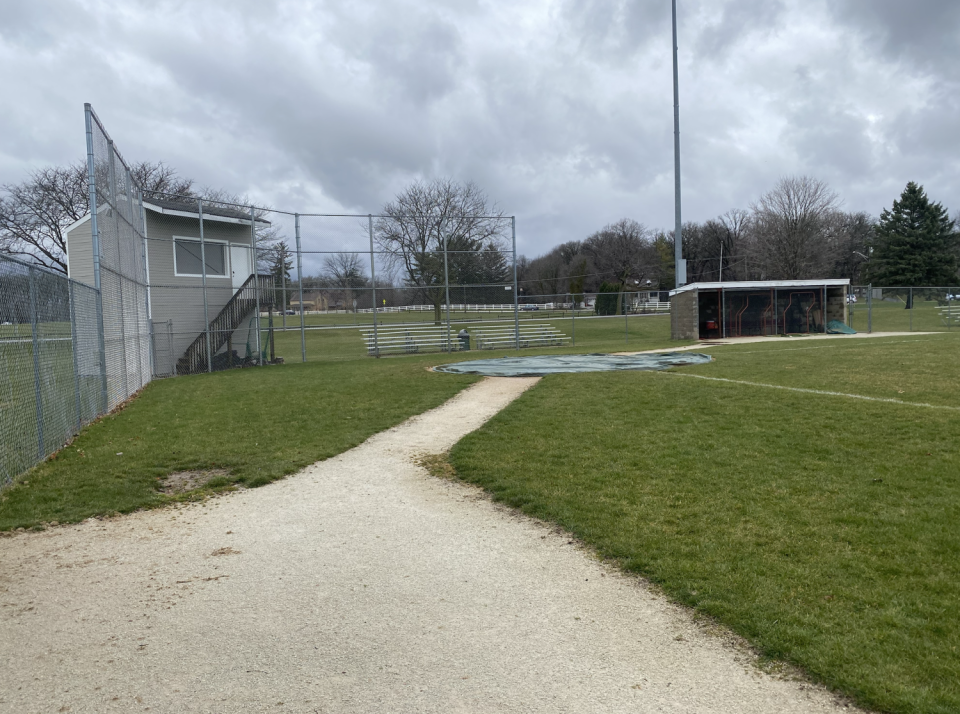
In the high school’s 100-year history, it’d had only one previous MLB player (a second baseman named Chuck Hiller, who spent most of his eight-year career in the 1960s with the San Francisco Giants and New York Mets).
During Miller’s time there, there wasn’t even a baseball field on campus. Instead, the team played home games at nearby Petersen Park, a public field with barely enough bleacher space to fit the scouts who came to watch him. During the cold winter months, they practiced inside a converted hardwood basketball gym, retrofit with retractable batting nets, roll-away pitching ramps and a faux indoor infield.
“We didn’t have much,” Miller said. “But we made the most of it.”
From the pitcher’s first days in high school, Rockweiler and his staff realized they had a star on their hands. Miller was the No. 2 starter on varsity as a freshman. He was committed to Louisville by the end of his sophomore year.
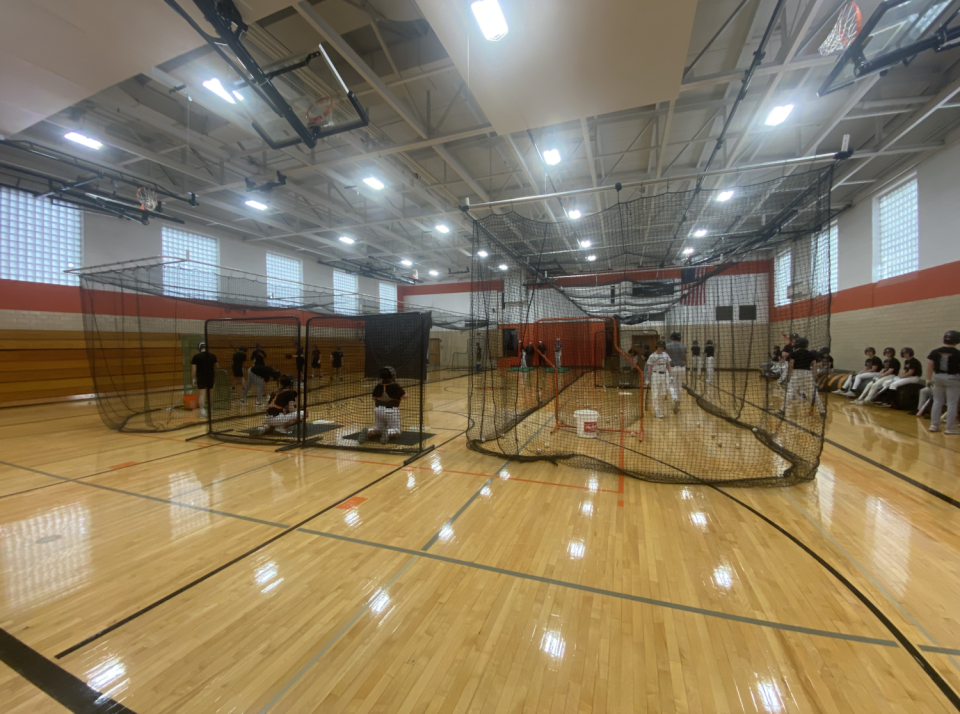
His physical tools made him an instant standout. His easy velocity long hinted at a future few of his peers could ever dream.
“Baseball-wise,” Rockweiler said, “he was by far the best athlete I’ve coached.”
Getting to the majors, however, required more from Miller than athleticism alone.
While he was a mellow, laid-back presence off the field — “all of his friends were the class clowns,” said Chris Madson, McHenry High’s athletic director, “but he was the most polite and quiet one” — Miller’s ability to flare up on the rubber was perhaps his most important trait.
Miller’s parents first noticed that side of their son when he started playing soccer as a 4-year-old. They remember him spending hours dribbling a ball in the backyard. How, if he failed to score in a game, he’d come home angry and upset, having set from a young age high personal expectations.
“He just had a competitive edge on his shoulder,” Tracy said.
The same was true when he switched to baseball full time a few years before high school.
Miller never skipped a day in the school’s spacious second-story gym, where his name was sprawled across the school’s weight-lifting leaderboard.
He refused to be pinch-run for during games, even though high school rules allowed it for pitchers.
He was a “perfectionist” with his craft, said his pitching coach Zach Badgley, pushing himself to sharpen the command of his overpowering fastball and develop secondary pitches, most notably a late-biting changeup.
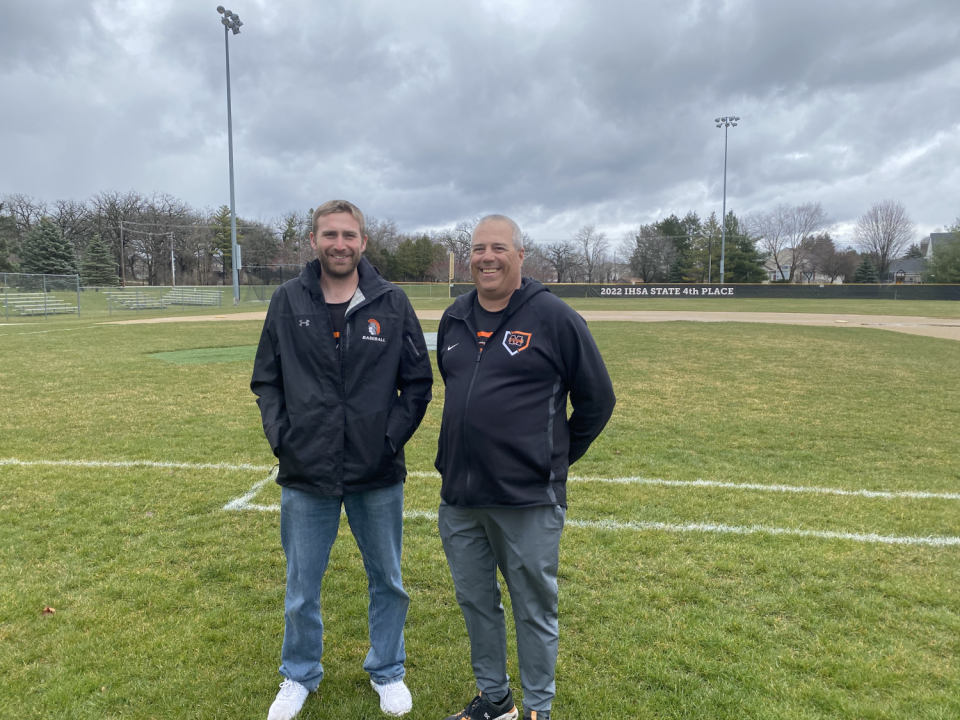
“In bullpens or side sessions, if he thought he wasn’t executing, it bothered him,” Badgley said. “In the games — obviously, in high school he would blow guys away — but if he didn’t feel like he was sharp, it would bother him.”
It’s the same dynamic that makes Miller among the more animated pitchers in MLB now. After big outs with the Dodgers, he’ll emotionally pump a fist and frolic off the mound. In moments of failure, he’ll chastise himself for any self-inflicted mistakes.
“We always talked about, ‘You may not be the best player out there, but don’t let anybody outwork you,’” said Bob, who his son once described as his greatest athletic influence. “It’s that ‘work your a— off' type attitude. And he actually took that, I think, to heart.”
Finding a way to balance such adrenaline, however, was among the biggest factors in Miller’s success.
In Miller’s early high school years, when he was still trying to prove himself as a rare underclassman on McHenry’s varsity squad, his dad remembers the in-game treatment other teams would direct his way.
Read more: Shohei Ohtani's 455-foot home run can't save Dodgers in 10-inning loss to Angels
“They would just ride him and ride him and ride him, knowing he was younger,” Bob said. “Then he committed to college at a young age, and people would ride him about that, just to try to get in his head.”
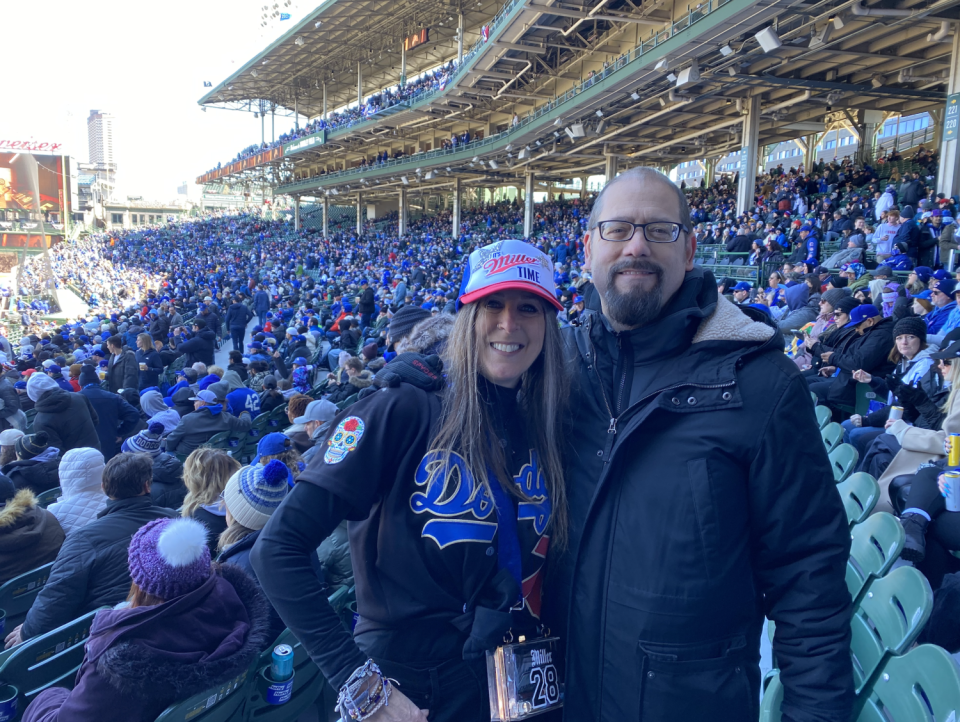
At times, it would work, prompting Miller to overthrow pitches and overheat mentally.
“When he was younger, it was difficult, him just getting control of those emotions,” Bob said. “With his competitive nature, it was all, ‘I gotta throw the ball harder.’”
But in the long run, such strain was necessary. Without that internal push, he might never have pitched his way out of his sleepy home city.
“We’d have to talk to him about getting control of his emotions when he’s on the mound, tune it all out,” Bob said. “And I think he’s learned to do that, especially now.”
The last chapter of Miller’s time with McHenry was the hardest, when a freak injury left his high school career with an unfinished feeling.
Every spring, Miller’s performance seemed to peak during the state playoff tournament. As a junior, he authored a seven-inning shutout in a regional semifinal win. The year before that, he was the winning pitcher in both the regional semifinal and championship game, convincing his coaches to let him pitch on just three days' rest in the latter contest.
“He would not take no for an answer,” Rockweiler said. “We kept telling him, ‘You’re gonna have a future past this.’ But he was just so competitive. He wanted to win.”
Miller’s senior season might have been McHenry’s most talented squad. Miller was not only dominant on the mound, but also as a slugging third baseman in the heart of the team’s lineup (he once hit a home run so far, it cleared a 40-foot protective screen beyond the right field fence).
The team rolled through its regional bracket and, one win away from a sectional final, had Miller lined up to start the season’s biggest game.
But then, during an intrasquad scrimmage days before that outing, Miller was running the bases when disaster struck.
“As I’m coming home, I’m almost walking, like light jogging,” he recalled. “And then my knee just locked up. I couldn’t move it.”
Read more: Dodgers injury updates: Bobby Miller, Clayton Kershaw progress but Max Muncy has setback
As he tumbled to the ground, Millers coaches first hoped he was only kidding. When they saw tears welling in his eyes, they knew he suffered something serious.
An MRI exam later that night revealed he’d torn his meniscus.
“That was heartbreaking for me,” Miller said.
In hindsight, however, it’s an ordeal he describes as both “a blessing and a curse.”
The curse was obvious. Without Miller, McHenry season’s ended in defeat the next week. And when he arrived at college later that summer, he had to complete an elongated rehab program.
He calls it a blessing, though, because of the way it forced him to readjust his perspective — how, for the first time, he channeled his competitive craze to handle cruel, random, uncontrollable adversity.
“Obviously, nobody wants to get hurt,” Miller said. “But then, you really sit there and think to yourself about, like, what you want to do with your life. You feel really sad that you can’t be on the field. But that’s when you start working your hardest, honestly.”
“We’d have to talk to him about getting control of his emotions when he’s on the mound, tune it all out. And I think he’s learned to do that, especially now.”
Bob Miller, on his son Bobby
Ever since then, his unrelenting internal drive has continued to find new unstoppable gears.
Not only did Miller make a full recovery by the start of his first Louisville season, but he went on to earn freshman All-American honors, help the school reach the College World Series as a sophomore, and emerge as a first-round pick of the Dodgers as a junior in 2020.
More important, it gave Miller a memory to lean on while coming back from his shoulder injury this year, applying the lessons he learned then to his efforts to re-establish himself in the Dodgers’ rotation now.
“It just makes me tell myself, I need to be working this hard year-round,” Miller said, having again found new perspective during his time away from the field. “I do work really hard. But now, there’s a lot of extra work that goes into it.”
It was like pouring more fuel on his competitive fire. Putting another chip on a shoulder already full of them.
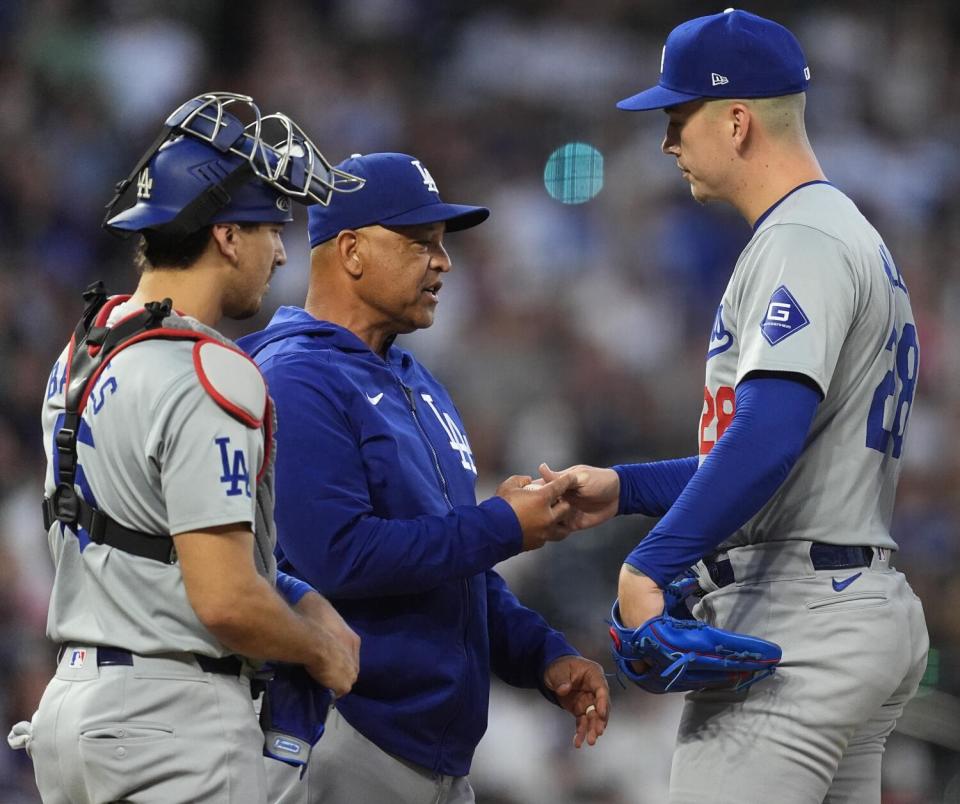
Miller’s latest return began last week, in a gritty five-run outing over 6⅓ innings at Coors Field, exiting the game in line for a win before the bullpen blew a late lead.
“It was just great to see him out there doing his thing,” Roberts said. “I know that he expects a lot of himself, even being his first outing [back from injury] … But to have him out there and give us a chance to win, that was big.”
Unsurprisingly, Miller was less enthusiastic in his personal assessment.
While he was happy to work into the seventh inning, he acknowledged at one point getting too wrapped up in the adrenaline of his return — with emotional control again playing an outsized role in the results of his outing.
“I just missed a fastball down the middle,” he said of a three-run homer he allowed in the first inning. “I tried to throw an elevated fastball, and did a little too much on it. Just pulled it down the middle, instead of focusing on executing the pitch and not trying to throw it too hard.”
Read more: Dodgers sacrifice short-term gains (a win Wednesday) for long-term goals (World Series)
Those are the moments the Dodgers hope Miller can continue to grow from. The ones they think can turn him into one of the majors’ most dominant young pitchers.
Such ambitions, after all, helped catapult his young career during his time in McHenry.
Just like back then, his demanding expectations are animating his crucial, competitive fire on the mound.
“It feels like in high school, when I first came in as a freshman and was being counted on as the young guy on the team,” Miller said. “That’s how I felt last year, being the youngest guy on the team. And that’s where I’m at right now, too, still one of the youngest on the team, but trying to play a big role.”
Sign up for more Dodgers news with Dodgers Dugout. Delivered at the start of each series.
This story originally appeared in Los Angeles Times.

 Yahoo Sport
Yahoo Sport 






































